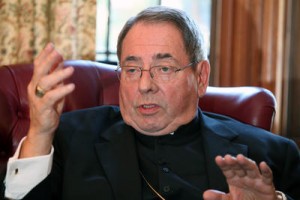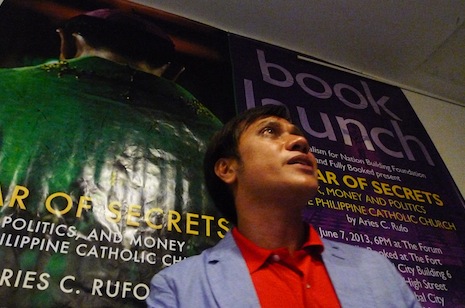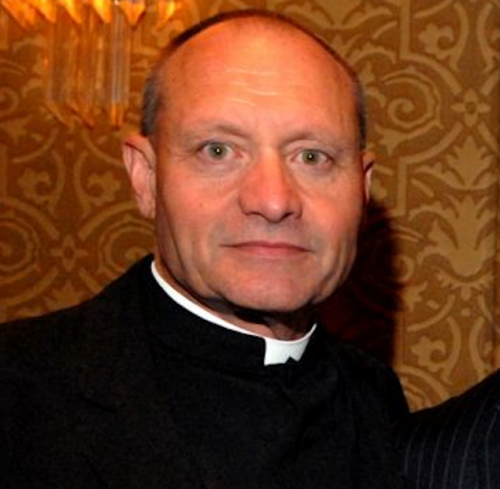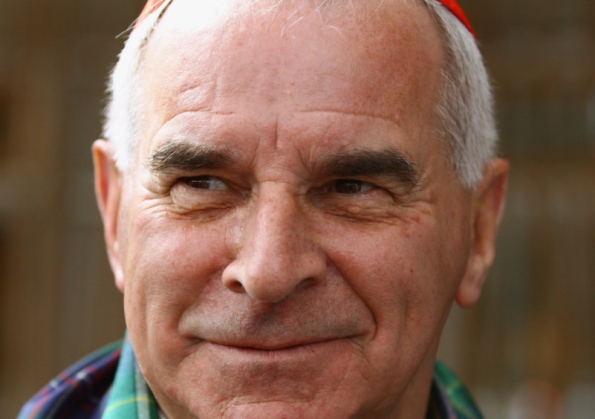Pope Francis, who has said he wants the Catholic Church to be a model of austerity and honesty, could restructure or even close the Vatican’s scandal-ridden bank as part of a broad review of its troubled bureaucracy, Vatican sources say.
By Philip Pullella
Francis, who inherited a Church mired in scandals over priests’ sexual abuse of children and the leak of confidential documents alleging corruption and infighting in the Vatican’s central administration, is mulling his options as he sets the tone for a reformed and humbler Holy See.
 One of the tests of his papacy will be what he does about the bank which has regularly damaged the Vatican’s image over three decades and faces growing calls for reform.
One of the tests of his papacy will be what he does about the bank which has regularly damaged the Vatican’s image over three decades and faces growing calls for reform.
Last year a European anti-money laundering body found that the bank – formally called the Institute for Works of Religion and known by the Italian acronym IOR – had failed to meet some of its standards on fighting financial crimes.
“Certainly if the pope wants to, he can close the IOR,” said a senior Vatican official, a prelate who had years of experience of directly dealing with the bank. The future of the IOR was one of main issues Francis would have to confront now that the whirlwind of his surprise election was slowing, he said.
Any significant reforms of the IOR would not come for some time and would probably be made after changes at the Secretariat of State, the central Church department which was at the center of a “Vatileaks” scandal that rocked the Holy See last year.
These changes would include the replacement of its head, Cardinal Tarciscio Bertone, who is number two in the Vatican hierarchy and has widely been blamed for failing to prevent the many mishaps and infighting in Church government during the eight-year pontificate of Pope Benedict.
“It will take time (to change the bank),” said another Vatican official who is not a prelate. Both officials spoke on condition of anonymity.
The second official believed it was more likely that the bank, which manages money for the Vatican, international Catholic religious institutions and orders of priests and nuns, would undergo “serious restructuring” rather than being closed.
“But I would not exclude anything, including closing it down the line. Francis is doing surprising things every day,” he said.
Both officials said the new pope might, as a first step, set up a committee to advise him on possible changes to the Vatican’s financial structure.
The first sign of change would be a new secretary of state. “It’s not a question of if but when Bertone leaves,” the senior prelate said. “It remains to be seen who the pope chooses as new secretary of state.”
CRISIS IN THE CURIA
The basic failings of the Curia, as the Vatican’s central administration is known, were aired, sometimes passionately, at closed-door meetings of cardinals before they retired into the conclave that elected Francis on March 13.
“The Curia did not come out smelling like a rose from those meetings,” the senior prelate said, adding that many cardinals had demanded explanations of the scandals and information on how the bank is run and whether it should exist at all.
“The IOR is not an essential part of the ministry of the Holy Father as a successor of St. Peter,” Cardinal John Onaiyekan of Nigeria told an Italian television station before the election of Francis. “The IOR is not fundamental, it is not sacramental, it is not part of (Church) dogma.”
Anger at the Italian prelates who mostly run the Curia was one of the reasons that the cardinals chose the first non-European pope for 1,300 years at the conclave and quashed the chances of one of the frontrunners, Milan Archbishop Angelo Scola.
The next secretary of state, the senior source said, would have to instill a new style of “collaboration and service” among offices of the Curia, whose image was badly stained by the “Vatileaks” scandal.
Before he resigned, Benedict left a secret report for Francis on the scandal, in which sensitive documents alleging corruption and conflict over the bank’s administration were stolen from the pope’s desk and leaked by his butler.
The butler, Paolo Gabriele, was arrested and sentenced by a Vatican court to 18 months in prison last year but Benedict pardoned him and he was freed just before Christmas.
Bertone has been directly linked to the IOR’s recent troubles. He was the chief promoter of Ettore Gotti Tedeschi, an Italian who headed the bank until last May when its board unceremoniously ousted him.
Gotti Tedeschi said at the time he was fired because he wanted the bank to be more transparent but board members said it was because he had neglected basic management responsibilities and alienated staff.
In 2010, when Gotti Tedeschi was still at the helm of the bank, Rome magistrates investigating money laundering froze 23 million euros ($33 million) the IOR held in an Italian bank.
The Vatican said the bank was merely transferring funds between its own accounts in Italy and Germany. The money was released in June 2011 but the investigation is continuing.
In February, the Vatican named a German lawyer, Ernst von Freyberg as new IOR president. But the appointment, made two weeks before Pope Benedict resigned, was clouded by Freyberg’s past business links to a military shipbuilder.
At the time of appointment, the Vatican said Freyberg would contribute to the IOR’s modernization and transparency in its attempts to meet international standards.
BAD IMAGE
“The Vatican Bank or IOR, is not unique. They are not the worst (bank), but certainly there are very serious problems that need to be addressed,” said E.J. Fagan, advocacy coordinator at Global Financial Integrity, an organization that seeks to curtail illicit money transfers.
“Pope Francis has very clearly stated that he wants to fight poverty. Money laundering of illicit financial flows is a major driver of global poverty and the Vatican should set a clear example,” he told Reuters.
The Vatican has been trying to shed its image as a suspect financial center since 1982 when Roberto Calvi, an Italian known as “God’s Banker” because of his links to the Holy See, was found hanged under London’s Blackfriars Bridge.
Moneyval, a monitoring committee of the 47-nation Council of Europe, said last July that the Vatican had failed to meet all its standards on fighting illicit cash flows, tax evasion and other financial crimes.
A report by Moneyval gave the Vatican an overall pass grade but failing grades on 7 of 16 “key and core” aspects of its financial dealings. It found major failings in the running of the bank, while acknowledging that the IOR was making changes to meet transparency requirements.
Five months before the Moneyval report, JP Morgan Chase closed the IOR’s account with the Milan branch of the U.S. banking giant because of concerns about insufficient transparency.
Italian media have reported that the bank, which currently answers to a commission of cardinals and enjoys great autonomy, could be placed under the control of another Vatican department, increasing the oversight called for in the Moneyval report.
Famiglia Cristiana, Italy’s leading Catholic weekly, called for the IOR funds to be administered by an independent “ethical bank” external to the Vatican.
“Total transparency would assure the faithful, who are continuing to offer generously, that the money they give to the Church, after the part used to guarantee the good running of the Church itself, would be destined primarily for the world’s poor,” the highly influential magazine said.
John Allen, author of several books on the Vatican and correspondent for the National Catholic Reporter, said there was talk among cardinals at the pre-conclave meetings “that the Vatican does not need its own bank, and getting rid of it would eliminate a perennial source of speculation and conspiracy theories”.
Much of the estimated $7 billion managed by the bank, which was set up in 1942, belongs not to the Vatican but to religious orders and dioceses, who use it to transfer funds around the world.
Another option for the bank’s future would be to scale it down so it manages only funds needed to keep the Vatican running, drastically reducing the number of outside accounts and making it less vulnerable to possible abuse.
“We could just say to the Jesuits, the Dominicans, the Franciscans: ‘Sirs, you will have to take your business elsewhere’,” the senior prelate said.
However, part of bank’s profits have helped the Holy See balance its budget in the past, making up for deficits running into tens of millions of dollars.
This means that if the bank were to be phased out or closed, other sources of income would have to be found to fill the gap, the senior prelate said.
The Holy See would probably be careful, however, before relinquishing too much financial autonomy to outsiders so as to maintain its flexibility in emergency situations.
For example, before the fall of the Berlin Wall in 1989, the bank was able to move money to countries in the former Soviet bloc to keep Catholic Churches alive there in the face of communist repression.
Complete Article HERE!
 Years from now, what if a child says Fugee crossed a line?
Years from now, what if a child says Fugee crossed a line?



